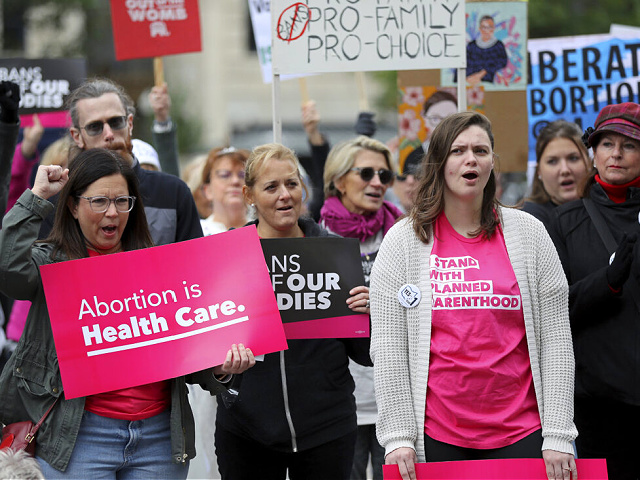As Ohioans vote on a ballot amendment that could enshrine the supposed “right” to abortion in the state constitution, left-wing activists pushing the amendment still refuse to clarify the broad language of the measure and what it could mean for parental rights and late-term abortions in Ohio.
Mehek Cooke, a Columbus-based attorney and spokeswoman for Protect Women Ohio, and pro-abortion activist Desiree Tims sparred over the amendment, called Issue 1, in a Spectrum News televised debate that was taped over the weekend and will air on WVIZ at 10 p.m. ET on Thursday.
Both women were questioned about the language of the bill, which has left many Ohioans confused about what the amendment would actually achieve if passed. The amendment, which was crafted by the ACLU of Ohio, uses words like “individual,” “health,” and “reproductive decisions,” all broad terms that critics of the measure warn could be used legally to decimate parental rights, lead to abortion throughout pregnancy, and even allow minors to pursue sex-change procedures.
WATCH THE DEBATE:
“Individual”
The ballot language states that Issue 1 would “establish in the Constitution of the State of Ohio an individual right to one’s own reproductive medical treatment, including but not limited to abortion.” [emphasis added]
Before the language of the amendment was changed significantly by Ohio Secretary of State Frank LaRose (R), the ballot measure stated, “every individual has a right to make and carry out one’s own reproductive decisions, including but not limited to decisions on: contraception, fertility treatment, continuing one’s own pregnancy, miscarriage care, and abortion.”
Critics of the measure have argued that not specifying an age in the language could result in the eventual repeal of parental notification laws for minors who are trying to obtain abortions.
Ohio Attorney General Dave Yost published a legal analysis of Issue 1 and found that while the language makes no mention of parental consent laws, “the parental-consent statute would certainly be challenged on the basis that Issue 1 gives abortion rights to any pregnant ‘individual,’ not just to a ‘woman.”‘
“Before Roe was reversed, parental consent laws were regularly challenged in courts. If Issue 1 passes, the question for a court will be whether the term ‘individual’ includes a ‘minor.’ There is no guarantee that Ohio’s parental-consent law will remain in effect,” Yost wrote.
The debate participants were asked how a “yes” or “no” vote on the amendment could impact parental consent laws. Pro-abortion activist Tims claimed that concern about parental consent is based on “misinformation” and claimed minors would still require parental consent for any medical procedure.
“There isn’t any language that includes anything about children. In fact, children will still have to receive parental consent for any medical procedure,” Tims said.
“Issue 1 is about the extreme abortion ban that is currently on the books and our ability to make medical and healthcare decisions for ourselves and removing politicians from the process,” she continued, referring to a six-week heartbeat abortion restriction which is currently paused by a state judge.
But later, Tims stated that Issue 1 is about “ensuring that every Ohioan can make a decision for themselves, removing the government and politicians out of that.” [emphasis added]
Cooke responded to the same question, wagering, “If this was truly about abortion, they would’ve used the word ‘woman’ instead of ‘individual.'”

Buttons in support of Issue 1 sit on display at a rally held by Ohioans United for Reproductive Rights at the Ohio Statehouse in Columbus, Ohio, Oct. 8, 2023. (AP Photo/Joe Maiorana)
“They would’ve stated that there was an age limit to perform an abortion. They don’t do that. They’re taking away parental consent and notification,” Cooke said.
Cooke also pointed out later in the debate that the ACLU drafted a similar pro-abortion amendment in Florida, in which — unlike the broad Ohio version — the language includes deference to parental consent laws.
“And if this was not about our children and about parents, then why doesn’t it have some type of age limit? I’ll tell you, the ACLU drafted a similar amendment in Florida. They went back and they revised it and said, ‘you may require parental consent if the legislature passes a law’ because they knew not to mess with parents when it comes to our children,” Cooke said.
Left-wing fact-checkers have been quick to assert that the amendment would not impact parental rights. But when local media questioned the ACLU of Ohio in March as to whether the language of the measure would undo parental consent and notification laws, the organization vaguely indicated that those laws would not stand if the amendment passes.
“When you pass a constitutional amendment, it doesn’t just automatically erase everything and start over. But it would mean that laws that conflict with it cannot be enforced, should not be enforced,” said Jessie Hill, an attorney for the ACLU of Ohio.
Some of the far-left groups behind the ballot measure also have a history of campaigning to end parental notification laws.
“Health”
Issue 1 would only allow the state to prohibit abortions after an unborn child is deemed “viable” (usually around 22 to 24 weeks) by a patient’s physician and only if the physician “does not consider the abortion “necessary to protect the pregnant woman’s life or health.” [emphasis added]
The language also states that the measure will “always allow an unborn child to be aborted at any stage of pregnancy, regardless of viability, if, in the treating physician’s determination, the abortion is necessary to protect the pregnant woman’s life or health.” [emphasis added]
The language does not define what the broad term “health” means, a move that Constitutional scholars warn could open the door for abortion at any stage of pregnancy.
Constitutional scholars Carrie Campbell Severino, President of the Judicial Crisis Network, and Frank J. Scaturro, a former special counsel to the House Select Investigative Panel on Infant Lives wrote:
The insertion of the word “health” in this provision without any qualification poses the added problem that arose under Roe, where the Supreme Court by judicial fiat also injected a “health” exception for any prohibition of post-viability abortion: Over the course of several abortion cases, the Court employed a notion of health so broad that, for many lower courts, including the U.S. Court of Appeals for the Sixth Circuit in an Ohio case in 1997, it was enough for a doctor to be willing to approve the procedure based on “emotional” and “familial” factors. This effectively permits abortion at any stage of pregnancy up to the time of birth.
Debate participants were asked to answer how the broad term “health” would be applied, should Issue 1 pass. Tims did not answer the question but, instead, argued that “politicians shouldn’t be defining health.”

Supporters of Issue 1 attend a rally held by Ohioans United for Reproductive Rights at the Ohio Statehouse in Columbus, Ohio, Oct. 8, 2023. (AP Photo/Joe Maiorana, File)
“That’s between the science and the physician studying healthcare. Every doctor will tell you every pregnancy is different. And I trust doctors to make an assessment about their patient in terms of their healthcare,” she said.
“I don’t even have to think about this,” Cookie countered. “It’s what the Supreme Court has said: they have held that health is financial, social, mental.”
“So at the end of the day, the Supreme Court has already ruled on this,” she continued. “It is up to the doctor, the abortionist — they get to define what health is today, and that is unacceptable.”
Yost in his analysis noted that regulation of post-viability abortions would be “technically possible but would be ineffective” if the amendment passes.
“The Amendment allows the State to prohibit abortion after viability, ‘but in no case’ if the doctor thinks it necessary to protect the mother’s life or health — a broad concept that is not defined in the Amendment,” he wrote. “Issue 1 gives sole discretion to the physician in deciding if the law applies, with no requirement for a second opinion or objective criteria for evaluating the physician’s professional judgment.”
“Reproductive Decisions”
Issue 1 also states that it would “establish in the Constitution of the State of Ohio an individual right to one’s own reproductive medical treatment, including but not limited to abortion.” [emphasis added].
The original language of the measure stated: “every individual has a right to make and carry out one’s own reproductive decisions, including but not limited to decisions on: contraception, fertility treatment, continuing one’s own pregnancy, miscarriage care, and abortion.” [emphasis added]
Critics of the measure say the broad terms “included but not limited to,” “reproductive medical treatment,” and “reproductive decisions,” could also entail sex change procedures, cross-sex hormones, and puberty blockers. Combined with fears over the evisceration of parental consent laws, some are concerned the passage of Issue 1 could eventually enable minors to obtain life-altering transgender drugs and procedures without parental consent.
Fact-checkers have called these claims “unfounded” and “false.”
Yost, in his analysis, said the vague ballot language leaves “outcomes uncertain.”

People gather and pray during the Ohio March for Life rally at the Ohio State House in Columbus, Ohio, Oct. 6, 2023. (AP Photo/Carolyn Kaster, File)
He wrote:
These other areas of law are harder to assess because Ohio does not have specific statutes addressing minors’ access to these medical treatments or products. However, if the word “individual” as used in the Amendment includes minors, Ohio’s general laws concerning minors and health care could be affected.
Some other States have enacted, and some Ohio legislators have proposed, laws regarding transgender treatment of minors. Given the uncertainty of the breadth of the terms “reproductive decision” and “individual,” as discussed above regarding parental consent for abortion, challenges are certainly likely, with outcomes uncertain.
It would certainly be too much to say that under Issue 1 all treatments for gender dysphoria would be mandated at the minor individual’s discretion and without parental involvement. This is a developing area of the law nationally, and all that could be said with certainty is that Issue 1, if passed, would impact the analysis of any future law.
When asked why the question about transgender procedures continues to arise, Cooke replied, “What’s a reproductive decision? It’s something that impacts your reproduction. So it could be cross-sex hormone therapy, transgender surgeries, anything.”
“Reproductive decisions should have been defined, but it wasn’t. And we see across the country, state by state, [the] targeting our young children,” she continued.
“The state of Washington, they just passed a law that allows for a child to go through life altering painful surgeries without parental involvement or notification. They get to stay at six weeks at a Safeway house,” she said. “That is not what we want. Again, if we want to have these in-depth discussions about abortion, let’s have them. This amendment stops all of those discussions. This amendment allows for our children to be targeted.”
Tims responded by claiming Cooke “didn’t answer the question because the answer to the question would be more misinformation.”
“The reality is this language has nothing to do with trans children. I’ve already explained the law of the land is that any child trying to seek medical treatment or any procedure must have parental consent,” she said.
Ohioans have the opportunity through election day on November 7 to vote on Issue 1.
Katherine Hamilton is a political reporter for Breitbart News. You can follow her on X @thekat_hamilton.

COMMENTS
Please let us know if you're having issues with commenting.